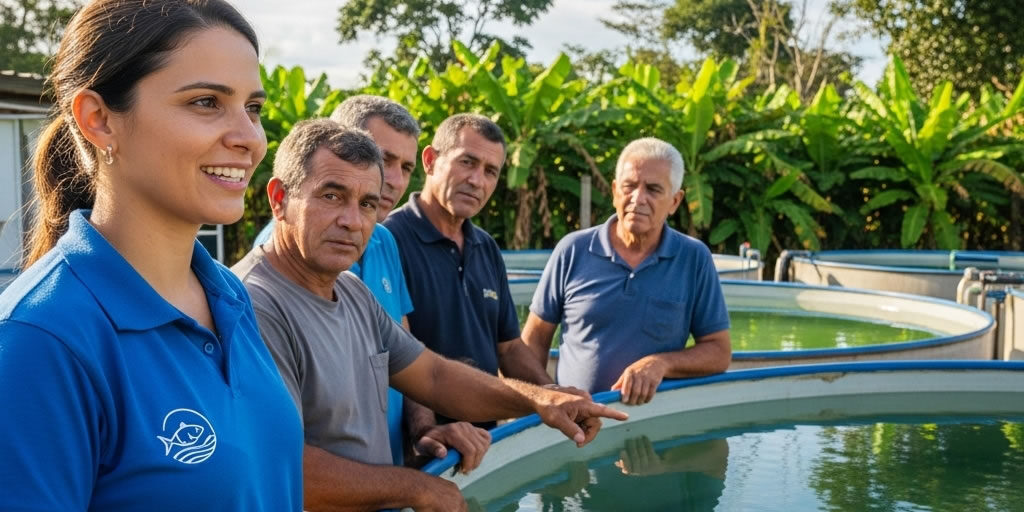- Software Gestor para Aquicultura
- (85) 2139-6730
- contato@despesca.com.br
Social Responsibility in Aquaculture: Strengthen Your Brand Through Local Community Engagement

Aquaculture Cold Chain: Ensuring Your Seafood’s Quality
25/08/2025
Biofloc vs. Conventional Systems: A Comparative Analysis of Costs, Investment, and Profitability
27/08/2025In an increasingly conscious market, the excellence of an aquaculture product is not measured solely by its taste, size, or sanitary quality. Consumers, investors, and business partners are paying close attention to the origin of their food and the impact its production has on the environment and society. In this context, social responsibility ceases to be a cost or a philanthropic act and becomes a fundamental strategic investment, capable of strengthening the brand, ensuring the business’s sustainability, and building a solid long-term reputation.
Engaging with the local community is one of the most important pillars of this strategy. A shrimp or fish farm is not an island; it is part of a social and economic ecosystem. The way this relationship is built can define the success or failure of the operation.
The “Social License to Operate”: An Intangible and Essential Asset
Beyond environmental licenses and government permits, every productive activity needs a “social license to operate.” This is not a physical document but the ongoing acceptance and support of the local community for the farm’s operations. When a company demonstrates respect, transparency, and actively contributes to the region’s development, it earns this license.
The benefits are direct: reduced conflicts, easier hiring of labor, the creation of a positive business environment, and a natural shield for the brand’s reputation against crises. Ignoring the community, on the other hand, can lead to friction, complaints, negative publicity, and operational obstacles that directly affect productivity and profitability.
Practical Strategies for Effective Community Engagement
Genuine engagement goes beyond occasional donations. It’s about creating a virtuous cycle of mutual development. Some practical and high-impact strategies include:
- Prioritizing the Local Economy: Give preference to hiring labor from the community itself and seek local suppliers for inputs, services, and equipment. This injects resources directly into the local economy, generating jobs and income, and strengthening business ties.
- Education and Training Programs: Establish partnerships with local schools for environmental education programs, demonstrating sustainable farming processes in practice. Offering technical training courses in aquaculture to young people and adults in the community not only qualifies the workforce but also positions the farm as a center of knowledge.
- Open and Transparent Dialogue: Create permanent communication channels with community leaders, residents’ associations, and the general public. Holding regular meetings to present results, discuss expansion plans, and, most importantly, listen to the community’s concerns and suggestions is a sign of respect and transparency.
- Support for Local Initiatives: Identify and support social, cultural, or sports projects that are relevant to the community. Sponsoring a local soccer team, supporting a cultural festival, or helping to renovate a community space are actions that generate great visibility and strengthen the company’s positive image.
The Role of Organized Management in the Success of Social Actions
For social responsibility initiatives to be effective and sustainable, they need to be managed with the same rigor applied to production. This is where management technology becomes an indispensable ally.
An aquaculture management software allows the producer to organize and measure the impact of their actions. With it, it is possible to:
- Control Investments: Record all costs associated with social projects, such as donations, sponsorships, and training programs, ensuring precise budget control.
- Generate Data for Communication: Use reports to quantify the positive impact, such as the number of local jobs created, the percentage of purchases from regional suppliers, and the total amount invested in community projects. This data is gold for brand communication and marketing.
- Optimize the Manager’s Time: By automating routine tasks of production control, inventory, and finance, the system frees up valuable time for the manager to dedicate to planning and executing strategic actions, such as community relations.
Conclusion: The Community as a Strategic Partner
Investing in engagement with the local community is investing in the future of the farm itself. A strong brand is one that is admired not only for the quality of its product but also for the values it represents. By treating the community not as an external agent but as a strategic partner, the aquaculture farm builds a solid foundation of trust and mutual support, ensuring its sustainability and standing out positively in a globalized and demanding market.




